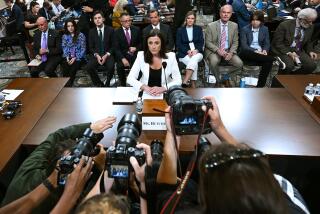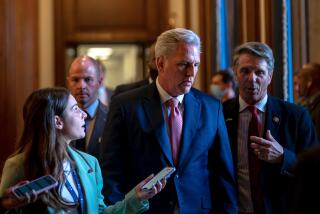THE IRAN--CONTRA HEARINGS : McFarlane Disputes North Authority Claim : Says He Did Not Approve Some Actions
- Share via
WASHINGTON — Former National Security Adviser Robert C. McFarlane on Tuesday sharply contradicted his one-time subordinate, Lt. Col. Oliver L. North, who had testified that he always kept his superiors fully informed about his role in the Iran- contra affair.
McFarlane returned to testify before the Senate-House investigating committees immediately after North left the witness table in a barrage of praise and criticism from members of the panel. Senate committee Chairman Daniel K. Inouye (D-Hawaii) acknowledged the hearings had succeeded “in developing a new American hero” during North’s stunning, six-day performance.
Persuasive Testimony
But, contrary to North’s highly persuasive testimony, McFarlane said he never authorized North to set up a military supply network for the Nicaraguan rebels or to carry out a variety of other activities related to supporting the contras and selling arms to Iran.
He attributed North’s misstatements to “a tendency for recollection to be colored by the way one would have liked to have acted.”
McFarlane called into question the central theme of North’s testimony: that he “never carried out a single act--not one--that I did not have the authority of my superiors.”
McFarlane, who left the White House in December, 1985, was the first of several witnesses who are expected to chip away at North’s credibility in the weeks to come. Today the committee will begin to hear testimony from Rear Adm. John M. Poindexter, who succeeded McFarlane as North’s superior and is the one witness who may be able to settle the many lingering questions about President Reagan’s knowledge of the Iran-contra affair.
Conservatives Angry
Conservative Republicans were angered by McFarlane’s return appearance before the committee because it appeared to them to be part of a concerted effort by the panel’s Democratic leaders to undermine the forceful defense that North had carefully constructed not only for his own actions but also for Reagan’s policies.
McFarlane’s testimony lacked any bitterness toward North, whom he insisted would never “make an intentional mistake or lie.” He speculated that North did not tell him about his illegal activities in order “to protect me” against any charges of wrongdoing.
“The fact that his own judgment about what fell within the scope of the authority I gave him differs from mine doesn’t mean that he has come up here and told you something that was false,” McFarlane said.
He joined the millions of Americans who praised North’s testimony, which he said was offered in “good faith.”
“It was a superb performance--passionate in delivery and persuasive in argument,” he said. “I believe that everything that has been said by members of this committee and others about Col. North’s bravery and devotion to his country is true.”
Got Casey’s Approval
McFarlane suggested that North, instead of coming to him for authorization, probably got approval for his exploits from the late CIA Director William J. Casey. He said Casey never told him anything about what North was doing either.
In fact, he said, Casey frequently complained to him about North’s activities--apparently repeating the sentiments of Casey’s by-the-book deputy, John N. McMahon. But he said he knew Casey’s “heart really wasn’t in it” whenever he criticized North.
McFarlane said he was completely unaware of Casey’s plan for North to use profits from the Iran arms sales--funds not appropriated by Congress--to establish a full-service apparatus that could conduct a variety of covert operations in addition to the Iran arms sales and the contra supply network. These plans grew to fruition after McFarlane left the White House.
Although North testified that it was Casey who first asked him to establish a secret military supply network for the Nicaraguan resistance in 1984, he said he also got approval from McFarlane, whom he briefed regularly.
No Violation Seen
North also insisted that the contra supply network did not violate the Boland amendment, which prohibited all U.S. intelligence agencies from providing support to the resistance from late 1984 until late 1986. North argued that the White House National Security Council staff, where both he and McFarlane worked, was not covered by the Boland amendment because it is not an intelligence agency.
McFarlane emphasized that he did not share that view. He said that while he instructed North to help the contras in legal ways, he would never have permitted a full-blown covert program to be operated out of the White House.
“This is untrue because it is unthinkable,” he said. “It violates every tenet of my political beliefs, everything that I have sought throughout my career to sustain and advance.”
The former national security adviser also contradicted North’s claim that he was briefed regularly.
“Col. North did report to me from time to time on a few, but certainly not all, of the activities that went beyond mere political support for the contras,” he said. “The committee has seen those memoranda--all six of them.”
McFarlane noted that in response to one such memo, in which North had sought his permission for a U.S. citizen to provide a helicopter to the contras, he replied that such a gift was probably illegal. He added that he rejected another memo in which North asked him to solicit funds for the contras from other countries.
He said the Reagan Administration’s hard-fought battle to revive direct U.S. military aid to the contras was proof of his belief that the Boland amendment restricted NSC activities. Otherwise, he asked, “Why would we have worked so hard to get rid of it after it passed?”
McFarlane stuck by his earlier testimony that he frequently admonished North not to solicit funds for the contras from private American citizens or other countries. Although North staunchly insisted that his own fund-raising activities did not constitute “solicitation,” he also said he never heard any such instructions from McFarlane.
The two men apparently had a very frank discussion of the subject of fund raising--punctuated by what McFarlane, a former Marine lieutenant colonel himself, called “some fairly candid Marine Corps expletives”--at one point during their tenure at the White House.
As McFarlane recalled it: “I said, ‘Look Ollie, this is Bud, this is me. This is not some some member of Congress. What’s the story? Are you raising money?’ And he said: ‘I have never in any fashion breached the law concerning any activities, nor have I ever raised money.’ It was very emphatic. I believed him.”
North testified that he had McFarlane’s support when he knowingly misled Congress about the extent of his support for the contras in 1985. At the time, he said, McFarlane even gave him copies of old memos that indicated he was violating the Boland amendment and told him to “fix it”--or, in other words, to alter the documents.
“This is incorrect,” McFarlane said. “In fact, Ollie proposed revision of certain other documents but only to conform them to his actual intent, which he said that I had misunderstood. I gave him an order to obtain my go-ahead for the project to revise pages which were grossly at variance with the original text. . . . So I did not approve it (and) I ultimately discarded them.”
Likewise, McFarlane rejected North’s version of how he allegedly participated in the drafting of a false chronology of events last November, shortly after the Iran arms sales became public knowledge. The chronology sought to hide Reagan’s approval of a 1985 Israeli shipment of U.S. arms to Iran.
North testified he was told by McFarlane, by then a private citizen, to write into the chronology that U.S. government officials were unaware of the details of an Israeli shipment at the time it occurred. He said McFarlane told him to state that U.S. government officials had been under the impression that the shipment contained oil-drilling equipment.
McFarlane himself acknowledged that his memory of the 1985 shipment was fuzzy by the time the subject came up in November, 1986. He acknowledged he told North that Reagan did not approve the shipment, but he insisted that it was North who contrived the story about oil-drilling equipment.
McFarlane also made these points:
--As far as he knew, the Administration had no “fall-guy plan,” as North described it, under which the mid-level Marine officer was to be made the scapegoat if the Iran-contra affair came to light. “But I don’t doubt for one minute,” McFarlane said, “that Ollie would have offered to step forward to protect me or his commander-in-chief, or both.”
--He held to his story that on Nov. 21, as the Iran-contra affair was unraveling, North threatened to hold a “shredding party.” Although North shredded many White House documents later that day, he denied he ever used the term “shredding party.”
--He never gave authorization, as North claimed, for retired Air Force Maj. Gen. Richard V. Secord to be recruited in 1985 to establish a supply network for the contras.
--He never gave authorization, as North testified, for his subordinate to instruct U.S. Ambassador to Costa Rica Lewis A. Tambs to assist the Nicaraguan resistance forces in opening “a southern front.” He said North asked him whether a southern front would be a good idea and he replied: “If they can do it, that’s fine.”
More to Read
Sign up for Essential California
The most important California stories and recommendations in your inbox every morning.
You may occasionally receive promotional content from the Los Angeles Times.













